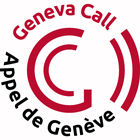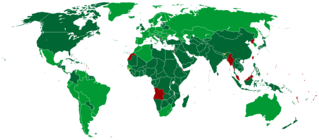Racism is the belief that groups of humans possess different behavioral traits corresponding to inherited attributes and can be divided based on the superiority of one race over another. It may also mean prejudice, discrimination, or antagonism directed against other people because they are of a different race or ethnicity. Modern variants of racism are often based in social perceptions of biological differences between peoples. These views can take the form of social actions, practices or beliefs, or political systems in which different races are ranked as inherently superior or inferior to each other, based on presumed shared inheritable traits, abilities, or qualities. There have been attempts to legitimize racist beliefs through scientific means, such as scientific racism, which have been overwhelmingly shown to be unfounded. In terms of political systems that support the expression of prejudice or aversion in discriminatory practices or laws, racist ideology may include associated social aspects such as nativism, xenophobia, otherness, segregation, hierarchical ranking, and supremacism.
The World Conference Against Racism (WCAR) is a series of international events organized by UNESCO to promote struggle against racism ideologies and behaviours. Five conferences have been held so far, in 1978, 1983, 2001, 2009 and 2021. Founded after World War II and the Holocaust as a dependent body of the United Nations, UNESCO started as soon as it was created to promote scientific studies concerning ethnic groups and their diffusion in public opinion to dispel pseudo-scientific rationalizations of racism. One of its first published works was The Race Question in 1950, signed by various internationally renowned scholars.

UNITED for Intercultural Action is a European network against nationalism, racism, fascism and in support of migrants and refugees, in which over 560 organisations from 48 European countries cooperate. UNITED was founded in 1992 and provides a forum for active solidarity and cooperation between a wide variety of organisations in Europe and their activists across European borders.
The 2001 World Conference against Racism (WCAR), also known as Durban I, was held at the Durban International Convention Centre in Durban, South Africa, under UN auspices, from 31 August to 8 September 2001.
The Gayssot Act or Gayssot Law, enacted on 13 July 1990, makes it an offence in France to question the existence or size of the category of crimes against humanity as defined in the London Charter of 1945, on the basis of which Nazi leaders were convicted by the International Military Tribunal at Nuremberg in 1945–1946.

Human rights are largely respected in Switzerland, one of Europe's oldest democracies. Switzerland is often at or near the top in international rankings of civil liberties and political rights observance. Switzerland places human rights at the core of the nation's value system, as represented in its Federal Constitution. As described in its FDFA's Foreign Policy Strategy 2016-2019, the promotion of peace, mutual respect, equality and non-discrimination are central to the country's foreign relations.
The article lists the state of race relations and racism in a number of countries.

Geneva Call is a non-governmental organization based in Geneva, Switzerland. It is currently focusing its efforts on banning the use of anti-personnel mines, protecting children from the effects of armed conflict, prohibiting sexual violence in armed conflict, working towards the elimination of gender discrimination and building armed non-State actors’ knowledge and implementation of broad International Humanitarian Law (IHL) rules.
The article describes the state of race relations and racism in the Middle East. Racism is widely condemned throughout the world, with 174 states parties to the International Convention on the Elimination of All Forms of Racial Discrimination by April 8, 2011. In different countries, the forms that racism takes may be different for historic, cultural, religious, economic or demographic reasons.
The Canadian Race Relations Foundation is a charitable organization and Crown corporation responsible to foster racial harmony and cross-cultural understanding and help to eliminate racism in Canada.
The Durban Review Conference is the official name of the 2009 United Nations World Conference Against Racism (WCAR), also known as Durban II. The conference ran from Monday 20 April to Friday 24 April 2009, and took place at the United Nations Office in Geneva, Switzerland. The conference was called under the mandate of United Nations General Assembly resolution 61/149 with a mandate to review the implementation of The Durban Declaration and Programme of Action from the 2001 World Conference against Racism, Racial Discrimination, Xenophobia and Related Intolerance which took place in Durban, South Africa.
Human rights in Estonia are acknowledgedas being generally respected by the government. Nevertheless, there are concerns in some areas, such as detention conditions, excessive police use of force, and child abuse. Estonia has been classified as a flawed democracy, with moderate privacy and human development in Europe. Individuals are guaranteed on paper the basic rights under the constitution, legislative acts, and treaties relating to human rights ratified by the Estonian government. Estonia was ranked 4th in the world by press freedoms.
The Declaration on the Elimination of All Forms of Racial Discrimination is a human rights proclamation issued by the United Nations General Assembly, outlining that body's views on racism. It was adopted by the General Assembly on 20 November 1963. The Declaration was an important precursor to the legally binding Convention on the Elimination of All Forms of Racial Discrimination.
Racism in Lithuania appears mainly in the form of negative attitudes and actions towards people who are not considered ethnically Lithuanian, especially if the foreigner is of different race. According to the data provided by the Centre for Ethnic Studies, Roma people, Chechens, refugees and Muslims are regarded with disfavour most of all in Lithuania. Anti-Polish sentiments are also very strong in Lithuania. However, recent research showed that Lithuanians themselves claim to be tolerant. The problem of racism is still not widely admitted, although the Government itself has put some effort to reduce xenophobia in Lithuania. Since the mid-2000s the Law on Equal Opportunities forbids any direct or indirect discrimination on the basis of racial or ethnic origin, gender, religion, nationality or belonging to any other group.
Expression of racism in Latvia include racist discourse by politicians and in the media, as well as racially motivated attacks. European Commission against Racism and Intolerance notes some progress made in 2002–2007, mentioning also that a number of its earlier recommendations are not implemented or are only partially implemented. The UN Special Rapporteur on contemporary forms of racism, racial discrimination, xenophobia and related intolerance highlight three generally vulnerable groups and communities: ethnic Russians who immigrated to Latvia under USSR, the Roma community and recent non-European migrants. Besides, he notes a dissonance between "opinion expressed by most State institutions who view racism and discrimination as rare and isolated cases, and the views of civil society, who expressed serious concern regarding the structural nature of these problems".
The Norwegian Centre Against Racism or Anti-Racism Centre is a non-governmental organization based in Oslo, Norway established in 1983. The organization’s main objective is to achieve a socially just society through the fight against racism and discrimination. The Centre works toward its objective through the documentation and prevention of racism, racism awareness, and the mobilization of the minority population in Norway.

The International Convention on the Elimination of All Forms of Racial Discrimination (ICERD) is a United Nations convention. A third-generation human rights instrument, the Convention commits its members to the elimination of racial discrimination and the promotion of understanding among all races. The Convention also requires its parties to criminalize hate speech and criminalize membership in racist organizations.
Racism in Thailand is a prevalent problem but is only infrequently publicly discussed. The United Nations (UN) does not define "racism"; however, it does define "racial discrimination": According to the 1965 UN International Convention on the Elimination of All Forms of Racial Discrimination, "...the term "racial discrimination" shall mean any distinction, exclusion, restriction, or preference based on race, colour, descent, or national or ethnic origin that has the purpose or effect of nullifying or impairing the recognition, enjoyment or exercise, on an equal footing, of human rights and fundamental freedoms in the political, economic, social, cultural or any other field of public life." Thailand has made two submissions to the Convention, with ongoing issues including government policy towards ethnic groups, especially the Thai Malays, and the country's lack of racial discrimination legislation.

Rita Izsák-Ndiaye is an independent senior human rights expert and former Hungarian diplomat. She has worked on human, minority and youth rights in various NGOs, the Hungarian Government and with international organizations. She served as the United Nations Special Rapporteur on minority issues between 2011 and 2017, as well as member and Rapporteur of the UN Committee on the Elimination of Racial Discrimination between 2018-2022. In 2021 and 2022, she was the Personal Representative of the OSCE Chairperson-in-Office on Children and Security. As of autoumn 2022, she is Senior Adviser on Anti-Racisam at UNDP.




